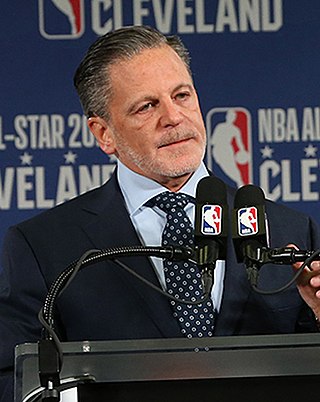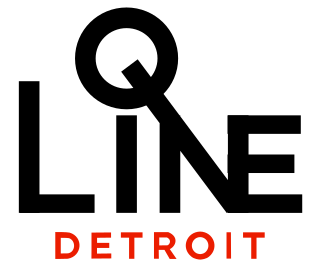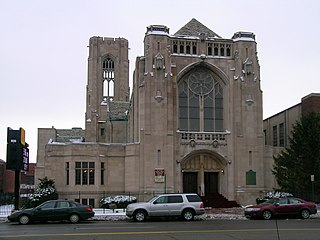
The Detroit People Mover (DPM) is a 2.94-mile (4.73 km) elevated automated people mover system in Detroit, Michigan, United States. The system operates in a one-way loop on a single track encircling downtown Detroit, using Intermediate Capacity Transit System linear induction motor technology developed by the Urban Transportation Development Corporation. In 2023, the system had a ridership of 656,500, or about 1,500 per weekday as of the fourth quarter of 2023.

Tides Foundation is a left-leaning donor advised fund based in the United States. It was founded in San Francisco in 1976 by Drummond Pike. Tides distributes money from anonymous donors to other organizations, which are often politically progressive. An affiliated group, Tides Advocacy, is a "massive progressive incubator." Tides has received substantial funding from George Soros.
Omidyar Network is a self-styled "philanthropic investment firm," composed of a foundation and an impact investment firm. Established in 2004 by eBay founder Pierre Omidyar and his wife Pam, Omidyar Network has committed over US$1.5 billion to nonprofit organizations and for-profit companies across multiple investment areas. According to the OECD, Omidyar Network's financing for 2019 development increased by 10% to US$58.9 million.

Daniel Gilbert is an American billionaire, businessman, and philanthropist. He is the co-founder and majority owner of Rocket Mortgage, founder of Rock Ventures, and owner of the National Basketball Association's Cleveland Cavaliers. Gilbert owns several sports franchises, including the American Hockey League's Cleveland Monsters, and the NBA G League's Cleveland Charge. He operates the Rocket Mortgage FieldHouse in Cleveland, Ohio, home to the Cavaliers and Monsters. As of January 2023, Forbes estimated his net worth at US$18.3 billion.
The Joyce Foundation is a non-operating private foundation based in Chicago, Illinois. As of 2021, it had assets of approximately $1.1 billion and distributes $50 million in grants per year and primarily funds organizations in the Great Lakes region.
Google.org, founded in October 2005, is the charitable arm of Google, a multinational technology company. The organization has committed roughly US$100 million in investments and grants to nonprofits annually.
Planning and development in Detroit since the late 20th century has attempted to enhance the economy and quality of life of Detroit, Michigan, United States. In 1970, the private group Detroit Renaissance began to facilitate development in the city. Its successor, Business Leaders for Michigan, has continued to facilitate development into the 21st century. Projects have included new commercial facilities, revitalization of neighborhoods, hospitality infrastructure, and improvements to recreational and public facilities, such as the QLine light rail project.

Charles McGee was an American artist and educator known for creating paintings, assemblages, and sculptures. His artwork is in the collections of the Detroit Institute of Arts and the Charles H. Wright Museum of African American History. He also had several large-scale public works in the city of Detroit.
Candid is an information service specializing in reporting on U.S. nonprofit companies. In 2016, its database provided information on 2.5 million organizations. It is the product of the February 2019 merger of GuideStar with Foundation Center.

The QLine, originally known as M-1 Rail by its developers, is a 3.3-mile-long (5.3 km) streetcar system in Detroit, Michigan, United States. Opened on May 12, 2017, it connects Downtown Detroit with Midtown and New Center, running along Woodward Avenue (M-1) for its entire route. The system is operated by M-1 Rail, a nonprofit organization.
The Community Foundation of the Eastern Shore (CFES) was established in 1984, and is located in Salisbury, Maryland. Its mission is to "To strengthen our community by connecting people who care with causes that matter to improve quality of life in our region" and its vision is for "...a community where all can live, learn, work, create and prosper". It serves the three lower counties of the Eastern Shore of Maryland: Somerset, Wicomico, and Worcester.
San Francisco Foundation is a San Francisco Bay Area philanthropy organization. It is one of the largest community foundations in the United States. Its mission is to mobilize community leaders, nonprofits, government agencies, and donors to advance racial equity, diversity, and economic inclusion. It focuses on social justice, community building, access to affordable housing, political action, policy change, workers' rights, employment opportunity, and civic leadership. Its current CEO is Fred Blackwell Jr.

The North End is a neighborhood located in Detroit, Michigan. It is located in the Woodward Corridor, a densely populated region along Woodward Avenue that stretches from Downtown Detroit to the suburb of Pontiac. The North End has been home to several development initiatives, seen by many as an area for future development extending from Downtown and Midtown.

Darren Walker OBE currently serves as 10th president of the Ford Foundation, a private foundation dedicated to human welfare. In June 2020, Walker led the Ford Foundation to issue a $1 billion designated social bond to stabilize non-profit organizations in the wake of COVID-19 pandemic. Walker is a member of the Reimagining New York Commission and co-chair of 2020 New York City Census. In October 2021, Walker announced that the Ford Foundation will divest its investments from "fossil fuels and seek opportunities to invest in alternative and renewable energy in the future"; including investing in "funds that address the threat of climate change, and support the transition to a green economy."
Arnold VenturesLLC is focused on evidence-based giving in a wide range of categories including: criminal justice, education, health care, and public finance. The organization was founded by billionaires John D. Arnold and Laura Arnold in 2010.

Capital Impact Partners, or simply Capital Impact, is an American congressionally chartered, District of Columbia nonprofit and certified community development financial institution that provides credit and financial services to underserved markets and populations in the United States. S&P Global issued Capital Impact its first rating in 2017.
The Chicago Community Trust is the community foundation serving Chicago, suburban Cook County, and the Illinois counties of DuPage, Kane, Lake, McHenry, and Will. Established on May 12, 1915, it is the third largest community foundation in the country as of 2019, with assets of more than $3.3 billion. The Trust awards more than $360 million annually in grants and has awarded more than $2 billion in grants since its founding. The Trust received gifts totaling almost $469 million during the 2019 fiscal year.

Richard "Rip" Rapson is an American attorney and philanthropist serving as CEO of the Kresge Foundation. He began his career as a congressional aide to Donald M. Fraser during Fraser's last two terms in the United States House of Representatives. After attending Columbia Law School, Rapson joined the law firm of Leonard, Street & Deinard to practice law while also serving on the board of several organizations. In 1989, Fraser, who had become mayor of Minneapolis, appointed Rapson as his deputy mayor and, in 1993, Rapson unsuccessfully ran for mayor to succeed Fraser.

Mother Cabrini Health Foundation is a private American charitable foundation that provides funding for healthcare and health-related initiatives in the U.S. state of New York, aimed at low-income and underserved communities. It is the largest health foundation focused only on New York.
Impact100 is a nonprofit philanthropic organization with local chapters in the United States, Australia, New Zealand, and the United Kingdom, that was founded by Wendy Steele in 2001.










